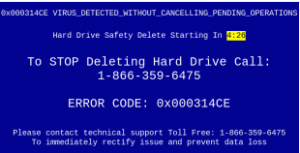Small businesses are targeted by hackers every day! Each year, there are different types of scams specifically targeted to attack small businesses.
According to the FTC, these are the top 5 small business scams to watch out for in 2017.
1. Directory scams
Small business owners are constantly getting sales calls from people or companies who want to list their company in an online directory. They mention a fee, but promise more visibility for your business. While this is a useful marketing tactic, you always want to double check where the request is coming from and make sure it’s an authentic source. Make sure you do your research before paying anyone any money online to do a service for you!
Recently, the FTC ended a directory scam run by a Slovakian company called Fair Guide that was responsible for stealing millions of dollars over several years. Read the whole story here.
2. Tech support scams
In our business, we see our clients calling in weekly with reports of tech support scams. This type of scam happens when the hacker poses as a technical support person (usually from a big name company like Apple or Microsoft) and tries to gain access to your computer to fix a “problem” that doesn’t exist. Sometimes, these scams even go as far as turning your computer screen blue as if you have an actual virus.
One of the new twists on this old school scam is a scammer contacting you claiming to be from the Global Privacy Enforcement Network. They tell you that your email is hacked and you’ve been sending fraudulent emails. They even go as far as to threaten to take legal action against you if you don’t give them access to your computer; big red flag right there! If you’re ever threatened or asked to pay any money to a person or corporation…stop right there and triple check that everything is authentic. Normally, actual corporations who would be looking out for you in these situations wouldn’t threaten legal action or request any amount of money.
Make sure that your employees know to never give control of their computer to someone claiming they can fix an issue they’ve found.
Here are some THB tips on educating your employees about cybersecurity.
3. IRS scams
This time of year these types of scams are most popular! Luckily, they’re also one of the easiest to avoid. There are a few things to remember when dealing with the IRS:
– If they need to reach you, they will use US mail first.
– They would never request personal information (credit card or social security numbers) over the phone.
– The IRS would never threaten to arrest or sue you.
– They would never ask for payment in the form of some sort of gift card or wire transfer.
If you are contacted by the “IRS” in any of these instances, you should know that it’s inauthentic.
4. Check scams
This type of scam is less popular than the rest, and even easier to protect against than the IRS scam. With these types of scams, you’ll be sent solicitations like bills, invoices, account statements, or a rebate/refund check – all fake!
It’s important to read the fine print carefully. Usually, by cashing the check or taking some sort of action with their solicitations you are agreeing to get billed monthly for services or products that you don’t need and terminating that contract you unknowingly made can be a traumatic experience all in itself!
5. Ransomware scams
It seems like every year there are more types of ransomware scams and each year they become more sophisticated, intricate, and deceiving than ever! Last year, many huge well-known corporations were victims of ransomware scams.
Ransomware is a type of virus that will infect your computer, encrypt your files and threaten to destroy them unless the victim pays money for the code to decrypt the information. According to the US Department of Justice, about 4,000 of these attacks occur a day in the US alone!
How can you avoid this happening to your business? Educate your employees! Teach them about being careful when opening attachments or clicking links in the body of an email because that’s how the hacker gains access to your information. As a general rule of thumb, if the email looks in any way suspicious…avoid it at all costs! Rather be safe than sorry. The use of firewalls and anti-virus software can help avoid instances like these.
We will help keep you up to date on current scams targeting small business, but remember education is key! Every employee (including the C-suite!) should be trained to spot a hacking attempt from a mile away. It’s always better to be safe than sorry!
For more best practices for small business cybersecurity check out this blog post.


Comments are closed.